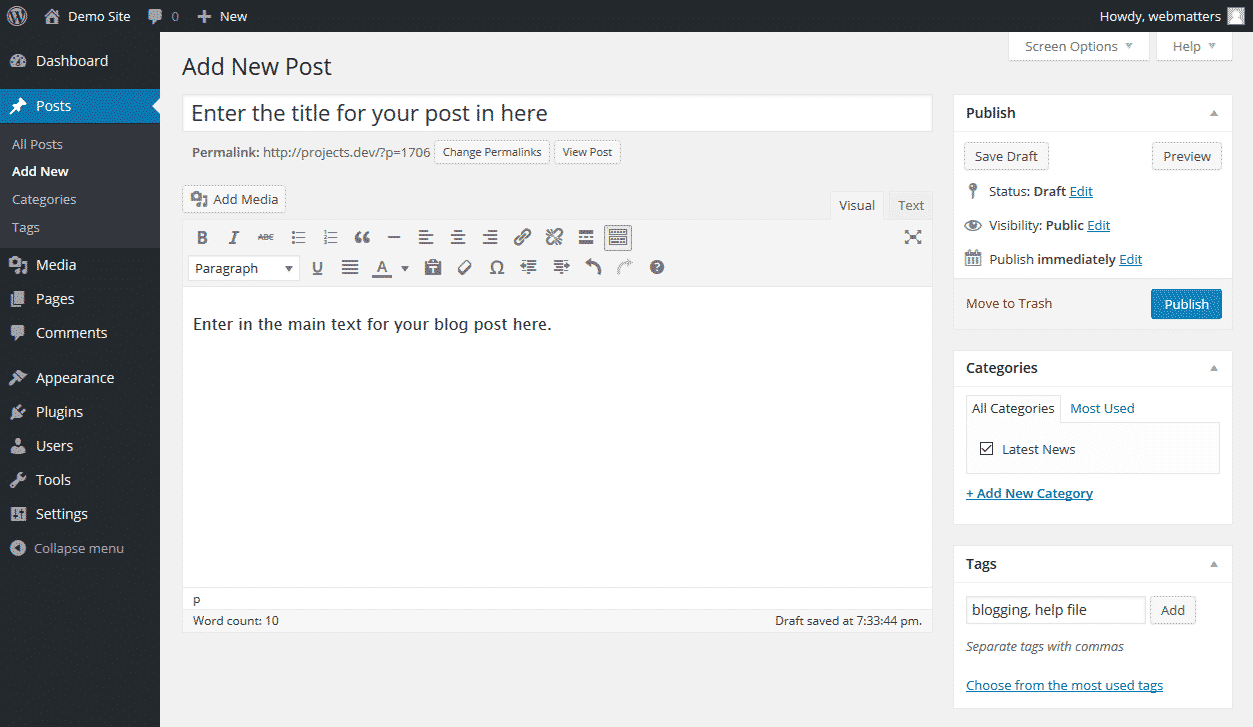Web Matters designs websites using the awesome WordPress content management system. So let's find out what it is, why we love it so much and how WordPress will benefit your business.
What is WordPress?
WordPress is an open-source content management system - online software that manages a website's content via a 'dashboard' that you log in to. Open source means the code is public, and anyone can use and modify the code. This openness is why so many people want to work with WordPress, with tens of thousands of web developers worldwide contributing to further developing WordPress and associated web services.
WordPress is very popular with end users (including business owners, entrepreneurs and hobbyists), and it powers around 43% of the websites in the world (as of October 2022 - https://w3techs.com/technologies/details/cm-wordpress).
WordPress was developed initially to help people create blogs and to democratise access to information. WordPress is now used for almost anything you can imagine (including online shops, learning management and membership systems).
Why does Web Matters use WordPress
Firstly we know it well and have a high level of expertise in building and managing WordPress websites. Many companies and web professionals make their living from WordPress.
Much of the software (plugins) that extends WordPress is also free, so that it can make for an affordable web solution. The commercial software available (as premium plugins) is often reasonably priced and available as either a one-time lifetime license or an annual subscription.
There is an awesome community around WordPress that helps and supports each other so they can help and support others (even people that might technically be competitors). The WordPress community includes plugin and theme developers, bloggers, consultants, designers, and Automattic - the company behind WordPress.com.
The key benefits of using WordPress for your Business:
Short Learning Curve - we've trained many people in how to use WordPress and have found a relatively short learning curve for users to get going with site updates due to the intuitive design of the WordPress administration system. This means your website is more likely to be updated, which is one of the main determinants of a successful website.
There's probably a 'plugin for that' - WordPress functionality can be extended considerably with additional WordPress plugins (software add on's). If you would like extra features or functions added to your site, there is a good chance that a free or commercial plugin exists to do the job.
It's Ubiquitous and Well Supported
Because WordPress is everywhere, it's well-supported. That means you will not get stuck in a system that will be defunct overnight or no longer supported.
It's Open Source, not proprietary software
Proprietary software is when a private company develops software; for commercial reasons and they don't release the code publicly. They will have created the system in-house and may have limited resources to develop it. You'll often find that if you want to move from their system (especially website builders), your content is locked into their system, and you'll need to start from scratch with your website.


Are there any downsides to using WordPress?
Like any tool, there are advantages and disadvantages, and WordPress is not always the right tool for the job (for example, Shopify might be a better option for many online retailers). Things can go wrong with WordPress, and sometimes frustratingly so. Often that's caused by neglect, which stems from WordPress end users not knowing what they don't know. That's why we offer a WordPress Website Check Up, so we can spot any issues and provide guidance on how best to get the website sorted.
Because WordPress is so popular and ubiquitous, it can be a target for those 'bad actors' looking to infect websites with malware or spam. This means it's important to keep WordPress up to date. That's why we offer WordPress Website Care Plans, which include things like regular off-site backups, two-factor authentication for logins, and adding a firewall to help protect WordPress.
A little story about how a 'loss' can transform a business....

Back in 2007, I had a potential client that had a strong preference to work with me. That was right up until they received a quote from another company that was significantly smaller than mine. Short on funds, they went with the other company.
I couldn't understand how the other designer could deliver at that rate, so I asked. Turns out, they were using 'WordPress' to build the site.
That struck me as odd, as back then, we only used WordPress for personal blogs. So I started digging into WordPress and learning everything I could.
There were very few web designers using WordPress from what I could see, but that only encouraged me as I saw it as an obvious competitive advantage.
By 2008, I was so excited about the potential of WordPress, that I attended 'WordCamp' in Sydney. At the WordCamp I got to hear a talk from the founder of WordPress - Matt Mullenweg. I had my eyes opened as to how awesome WordPress was and how inspiring Matt was as well.
Today, I am still learning about WordPress, as it continues to evolve and develop in ways we could never have imagined back in 2007. Michelle


